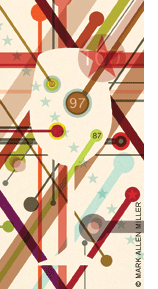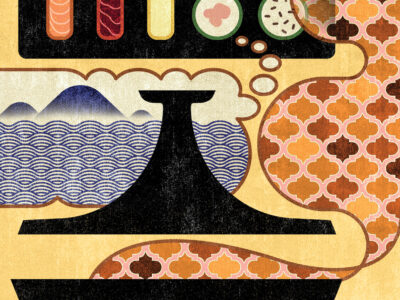
On a snowy January night, members of the Wharton wine team sipped and swirled pricy Bordeaux and answered esoteric wine questions at the French consulate in New York. The occasion was the first-ever US qualifier for Bordeaux’s annual 20 Sur Vin competition, and the Quaker MBA candidates were up against teams from Harvard Business School, Columbia’s business and law schools, and Kellogg at Northwestern.
The prize? A June trip to Bordeaux, where two teams each from business schools and universities in France, Europe, and—for the first time—Asia and the US will face off in Château Lafite Rothschild’s striking circular cellar, surrounded by barrels of very, very expensive wine.
For Nicolas Bentz WG’11, Megan O’Connor WG’11, Margot Stern G’11 WG’11, and logistics captain Elizabeth Jetton WG’12, the New York showdown was the culmination of no small amount of study.
“Business school students think they should know about wine,” said Stern, one of five co-presidents of the 230-member Wharton Wine Club. Yet no one on the team had much prior experience with drinking Bordeaux. Bentz, a 31-year-old who grew up in the southern French city of Perpignan, only discovered he liked wine at age 20—despite having a grandfather who grew grapes. As an engineering student in Paris, he drank “better value” wines from Alsace, the Loire, and the Rhône. He did visit Bordeaux with the school’s wine society, though.
O’Connor, also one of the club’s co-presidents, calls herself “a first-generation wine lover.” She became interested in vino when working in a wine bar in Rome, and claims to have a lot of experience drinking “cheap box wines.” Stern learned about wine while waitressing in college.
Founded in 2002, 20 Sur Vin is organized by the Commanderie du Bontemps, a syndicate of Médoc, Graves, Barsac, and Sauternes châteaux; one goal is to make sure the world’s future business elites learn about the great wines of Bordeaux. Three decades ago, they were invariably considered the best in the world. But today many more places, from the Napa Valley to New Zealand, make good and great wine. “The problem in the US is the young generation doesn’t know about Bordeaux,” said Emmanuel Cruse, whose family owns Château d’Issan.
After the teams settled at their assigned tables in a high-ceilinged consulate room, the judges—château owners and members of the Commanderie—made their entrance. In deep crimson velvet robes and jaunty matching hats, they looked impressively regal. Shiny tastevins—the little tasting saucers used by sommeliers—hung from a few necks.
“It seemed pretty intimidating, very Da Vinci Code,” observed Stern later.
As a small audience watched, Wharton won the first half of the contest—10 multiple-choice questions read out by Cruse, the “grand master” of the Commanderie—but struggled in the blind taste tests that comprised the second half. Example: List the three wines in front of you from youngest to oldest, then pick out which one is from Margaux. After the second flight, there were groans all around when no one recognized that one wine was from the lesser-known appellation Moulis.
The team had crammed for three months, divvying up study areas of wine history and viticulture and holding weekly sip-and-spit practice sessions in one another’s apartments and a few local restaurants.
“We pooled a total of $800 to purchase recent vintages,” explained Jetton. That’s a pretty minimal budget for Left Bank Bordeaux and sweet Sauternes; prices for top 2005s, 2006s, and 2007s are upwards of $50 to $100 a bottle. Luckily, a Delaware retailer—Pennsylvania’s state stores have a poor selection of Bordeaux—gave them a 30 percent discount.
To hide labels at their practice blind tastings, Bentz’s wife cut the toes from old black socks and slid them over the bottles.
“We tried to identify flavors and aromas and ways to characterize,” Stern recalled. “If it’s cedary, then it’s Pauillac…’”
In restaurants, O’Connor charmed sommeliers into giving her tastes from open bottles left by other customers.
To gain more exposure, they flew to Paris for the annual two-day Le Grand Tasting, where they sampled wines from dozens of châteaux and attended a Génie des Grands Bordeaux master class. A generous Wharton alumnus put them up at his apartment.
Now, back at the New York consulate, they sipped 2000 Rauzan-Segla and 1998 Ducru-Beaucaillou over a dinner of roasted pork and wild mushrooms, waiting for the results to be tallied. Presently French consul-general Philippe Lalliot rose to praise Bordeaux and the students, then Cruse followed to announce the outcome: In June, along with runner-up Harvard, the four Wharton students will head to the international finals in Bordeaux.
To shine on June 17, the team said they’ll have to hit the bottle even harder. “It helps that we won the first round,” said Bentz. Now they’ve reached out to the Philadelphia’s Commanderie de Bordeaux, an organization of wine lovers devoted to the region, who have promised to share wines with them.
With well-tuned tastebuds and a bit of luck, perhaps they’ll be able to repay the favor. The rumor is that the prizes for the final winners include magnums of Lafite.
—Elin McCoy CW’65




